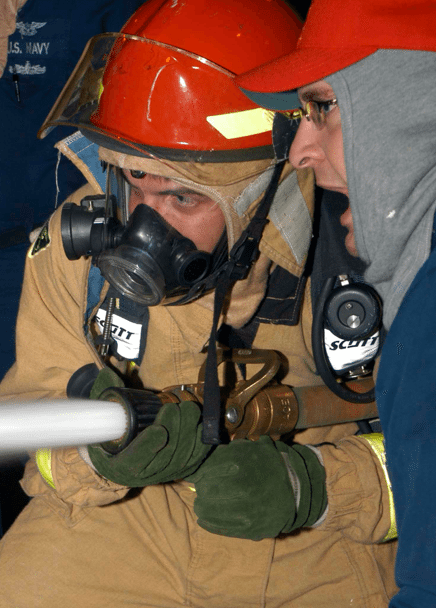Fire-Damaged Car Carrier Morning Midas Shows No Signs of Active Fire
The car carrier Morning Midas, which experienced a fire in its electric vehicle cargo deck on June 3, shows no signs of active fire according to salvage teams that recently...

Photo By Tom Guldner
By Tom Guldner
Marine companies today recognize their obligation to train their crews in everything that will be needed to do their job. New technologies in propulsion and vessel handling require hours of classroom and practical training. The crews I train on how to safely use the powerful Fi Fi (Firefighting) equipment needed to escort LNG vessels received my classroom seminars and have also spent hours training to put my safety messages to the test during their own open water drills.
Many marine companies have incorporated a safety official or even a safety office for larger companies.
So, you are the Captain of a commercial vessel which is one of just many in your company’s fleet. Corporate has mandated that you train your crews monthly in safety and fighting a fire on your vessel. You have complied and feel that your engineers and deck hands understand all that is required.
But consider this scenario… Last night one of your deck hands suffered a cut requiring stitches and will be out sick for several days. Your company’s Operations Manager assigned you a deck hand from another boat that is temporarily out of service for minor repairs and you get underway to meet your tight schedule.
As you leave the safety of your harbor and reach open water an alarm sounds in the pilot house for a fire in the engine room. You radio down for information but get no response. Just then your engineer enters the pilot house with blackened face and minor burns on his hands. He informs you that a high pressure fuel line ruptured spraying fuel on hot surfaces and ignited in a ball of fire. There is now a major fire in the engine room that is uncontrollable with extinguishers and there are no vessels in the immediate area to pick up your crew.
OK. This is what you trained for. You’ve gone over this with your crew many times and are comfortable that they all know their assigned duties during a fire. Your chief engineer requests permission to activate the fixed CO2 system for the engine room and states this is the only method that he fells may contain the fire. You have just enough CO2 on board to flood the engine room and you know that once activated all the CO2 on hand will be discharged at once.
You get on your intercom and inform all crew members to perform their assigned duties for a CO2 activation. After verifying that everyone is out of the engine room you then give the chief permission to activate the CO2 controls.
You hear the CO2 being discharged and prepare to monitor the ER and perform boundary cooling where needed. As you walk out onto the boat deck to supervise the stretching of fire hoses you see the five by seven foot vent from the engine room is wide open. Plumes of dense black smoke are spewing out under pressure. You also realize that the only CO2 aboard is also bleching out into the atmosphere. You close the door but realize that it is too late. You yell down to the two deck hands and ask, “Whose duty was it to close that door?” Your regular crew member informs you that he closed the vents he was assigned and everyone looks at the “New Guy”. He just says, “No one ever told me I had to close any vents”.
Your Mayday goes out and you have your crew prepare the life boat.
I don’t know if the scenario just mentioned ever actually happened but I have questioned crew members about their duties during a fire and especially prior to a CO2 discharge. Most of the time the ship or boat crew knew what was required but quite a few times I found crew members who had just been assigned or crew members who were working on a new boat who had no idea what their firefighting duties were or where the vents were that needed to be closed.
Is it negligence? No, I don’t believe that it is in most cases. It may just be an oversight on a vessel that normally has a well trained crew.
Anytime a new crew member comes aboard you must insure that he or she is aware of all the duties required of them while on your vessel. This must be done even if the assignment is just for the one day.
If you receive delivery of a new vessel all crew members must be well trained and familiar with all the safety equipment and exits aboard. Set up a detailed Station Bill that outlines each crew member’s duties in detail. Then if a new crew member comes aboard you can show him or her exactly what is expected of them. Assign a responsible crew member to take the new member around the vessel and point out all areas that the new member would be responsible for. Do the same thing regarding all safety and evacuation procedures. All of this must be done before you leave the dock.
Another thing regarding new vessels is to make sure that you have all required safety and operating equipment aboard before you place that vessel into service.

Tom Guldner is a retired Lieutenant of the New York City Fire Department’s Marine Division. Who also held a US Coast Guard License as a Ships Master He is a participating member of the Society of Naval Architects and Marine Engineers (SNAME) Fishing Vessel Operations and Safety panel and also their Small Working Vessel Operations and Safety panel. Tom is also a Principal Member of the NFPA Technical Committee on Merchant Vessels. His articles on Marine Firefighting have been published both nationally and internationally and can be found on his website www.MarineFirefighting.com.

Sign up for gCaptain’s newsletter and never miss an update

Subscribe to gCaptain Daily and stay informed with the latest global maritime and offshore news


Stay informed with the latest maritime and offshore news, delivered daily straight to your inbox
Essential news coupled with the finest maritime content sourced from across the globe.
Sign Up